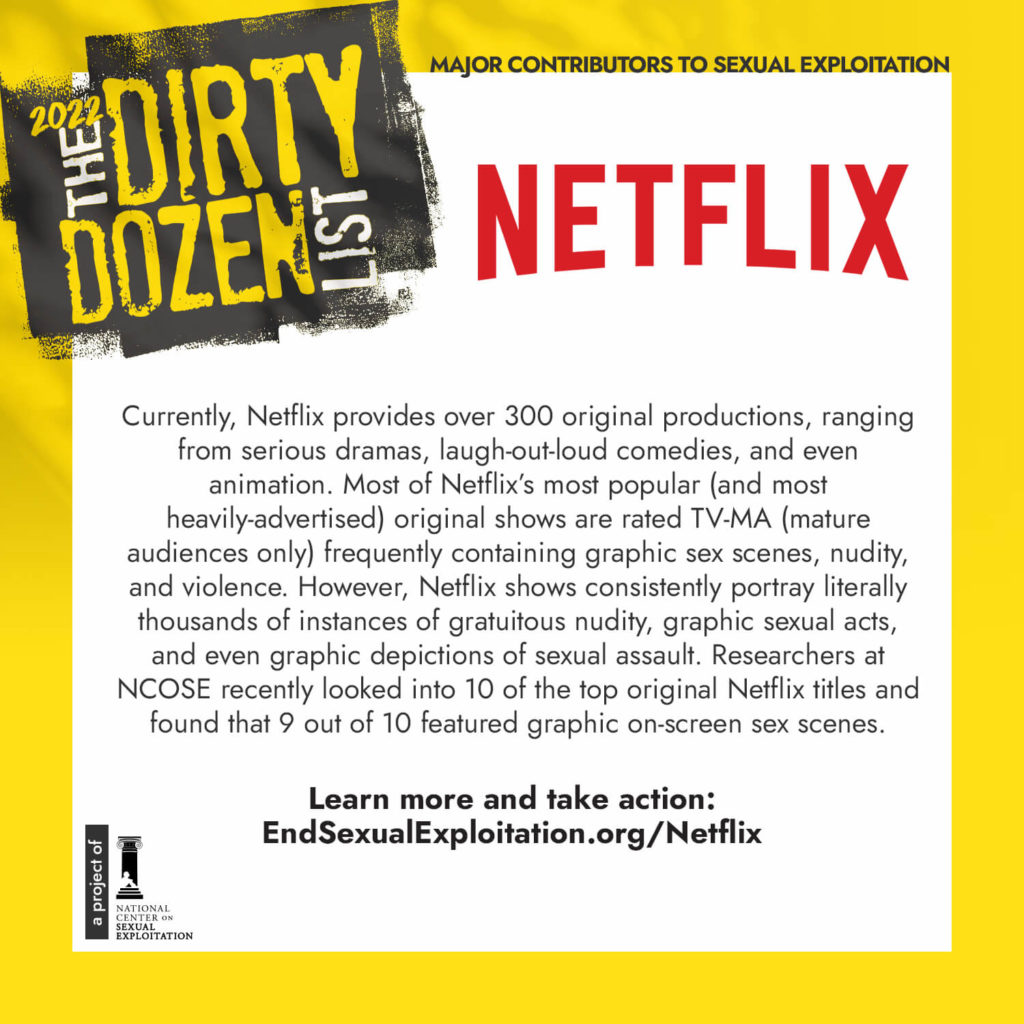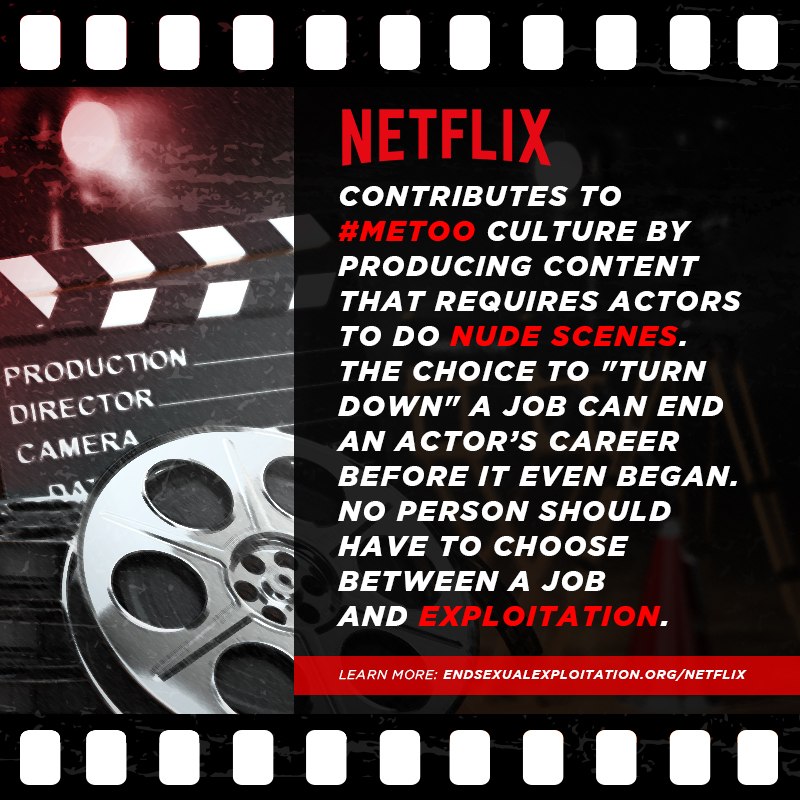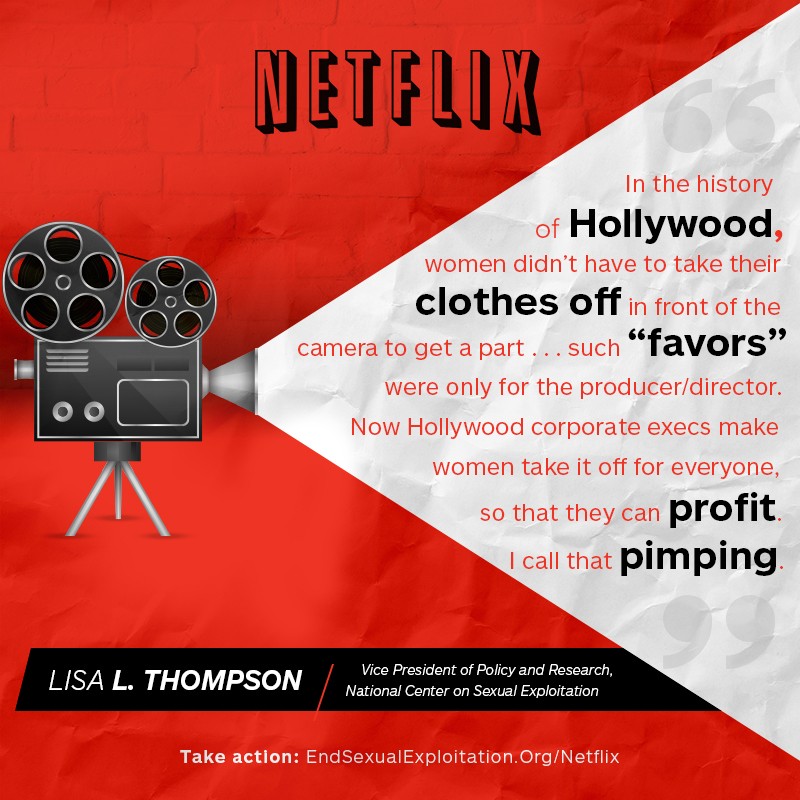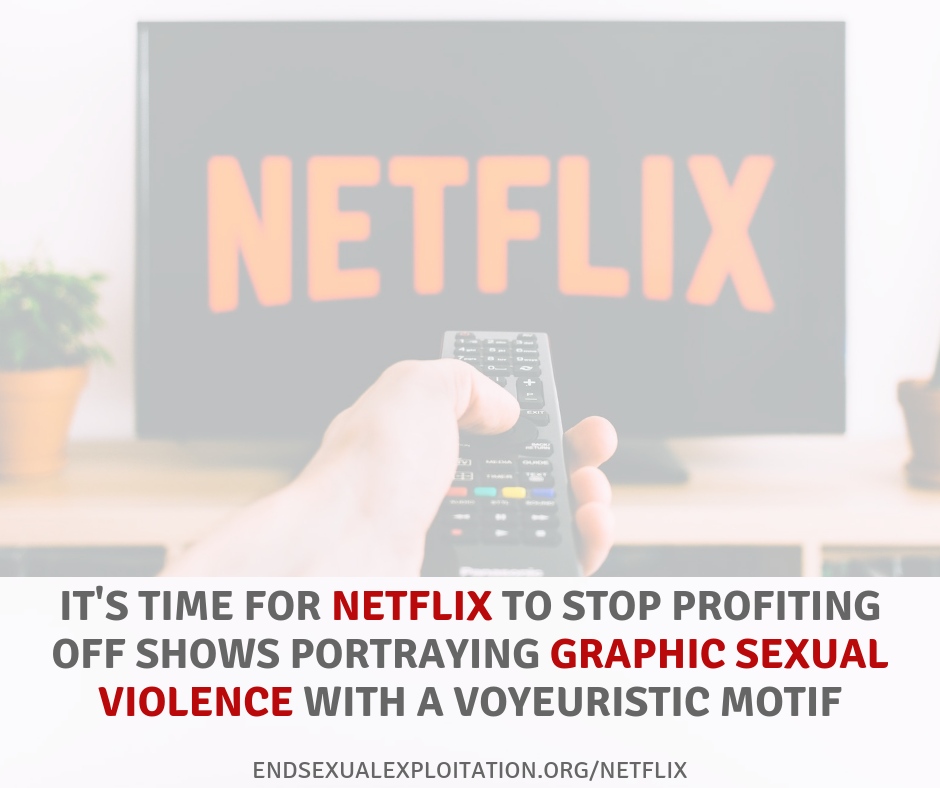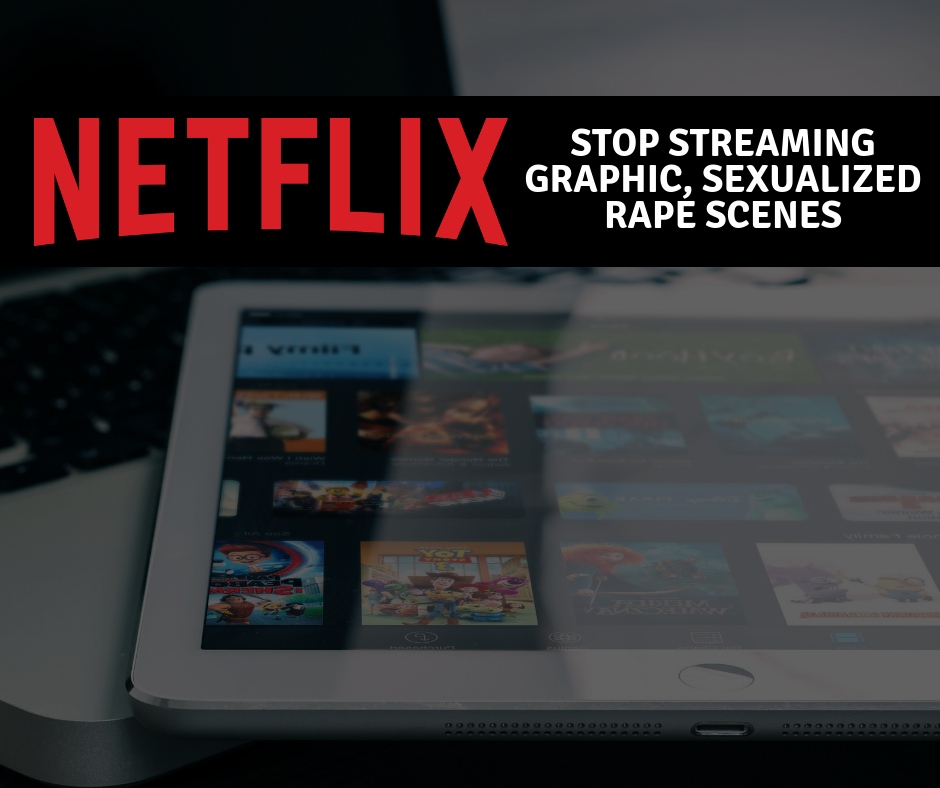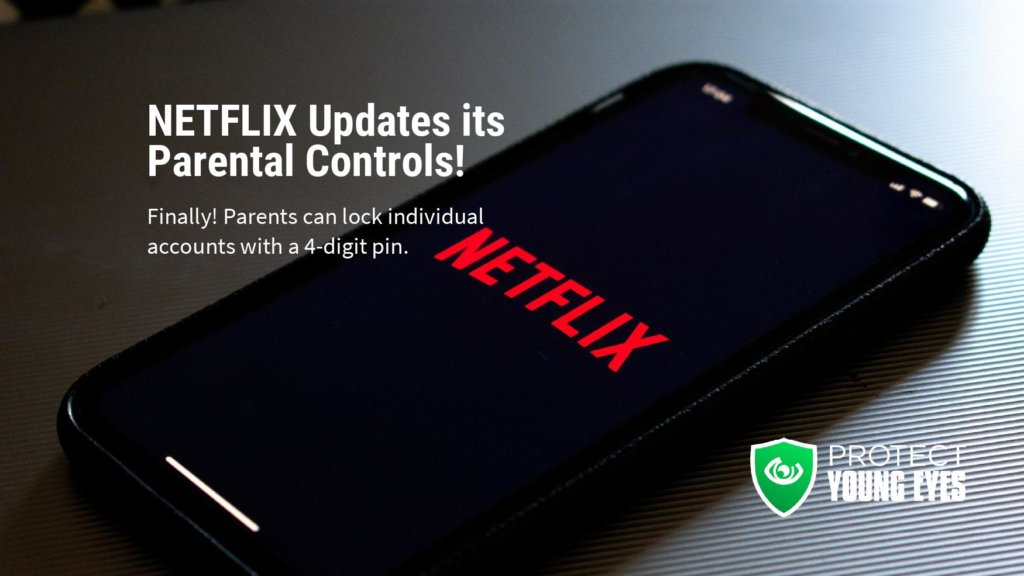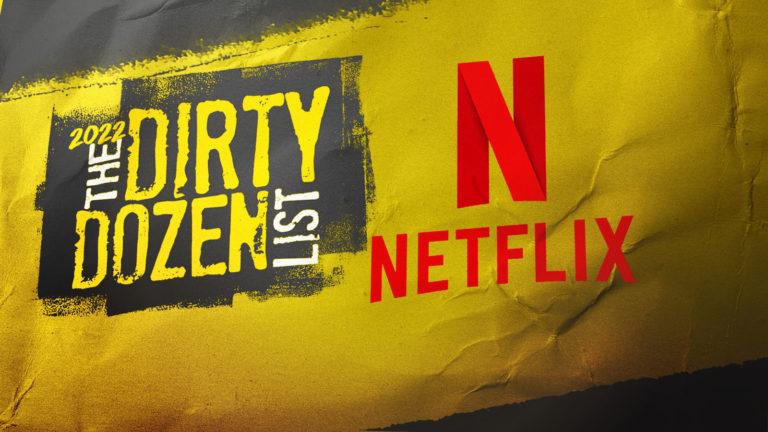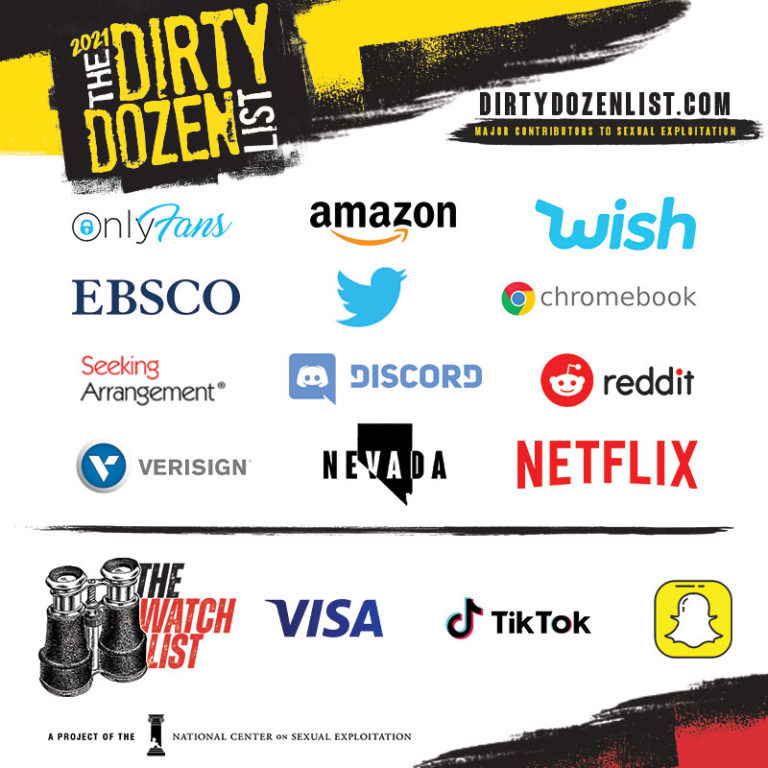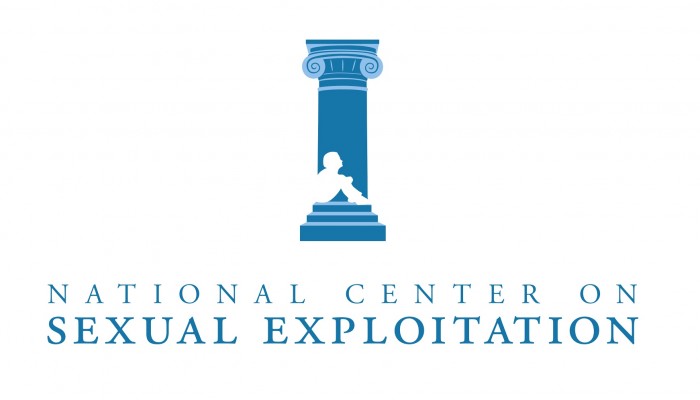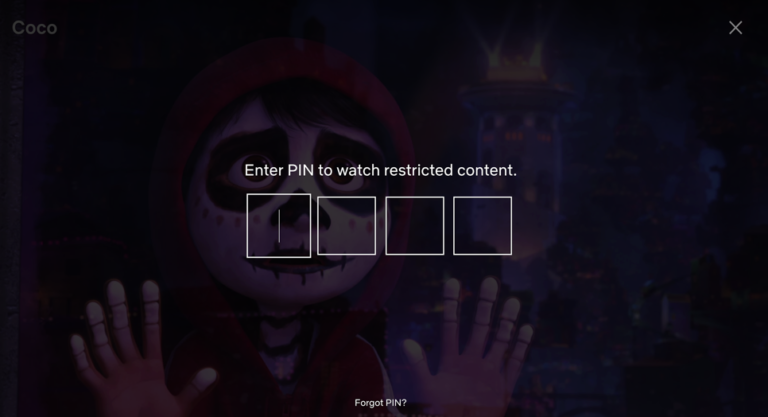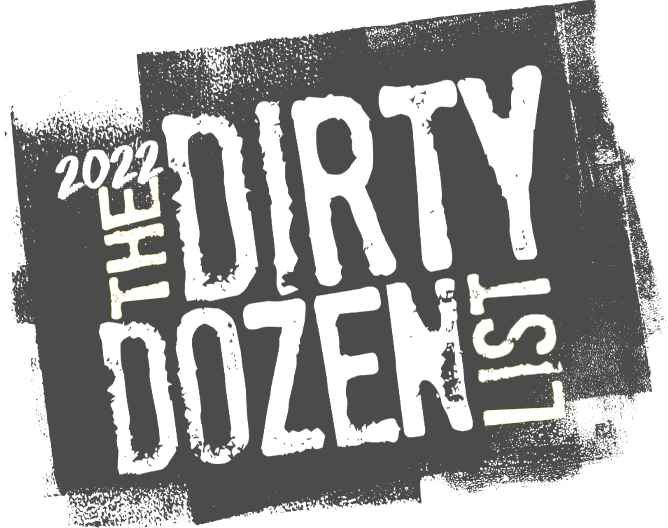

The Problem
Netflix is a staple of at-home entertainment, with over 200 million subscribers streaming their content worldwide. Yet mixed in with the fun and entertainment, is rampant sexual objectification and glamorization of abuse. Sociologists have identified a marked increase in graphic sex scenes and gratuitous nudity permeating Netflix shows. Further, Netflix continues a trend of normalizing the sexualization of children and whitewashing the violence and exploitation in prostitution.
Encourage Netflix to stop producing sexually explicit and exploitative content. Take action below!
What is Netflix?
Netflix is a subscription-based service that streams and produces films and TV shows. Netflix has over 200 million subscribers worldwide and in 2021 generated an annual revenue of almost 30 billion US dollars. This makes Netflix the number one most popular video streaming service in the world.
How Netflix Harms
Netflix claims that it wants to “entertain the world.” Unfortunately, it seems that Netflix will stop at nothing to achieve this goal. The company glorifies sexual violence, sexualizes children, normalizes incest, trivializes prostitution and child sex trafficking, and propagates graphic sex scenes and gratuitous nudity – all in the name of entertainment. Netflix regularly ignores calls by influencers and advocates to remove particularly egregious films, demonstrating their lack of corporate social responsibility and their callous willingness to profit from this horrific content.
Progress in Recent Years
Netflix has made significant improvements, after being named to the Dirty Dozen list in previous years, such as updating and strengthening parental controls and increasing the age rating on app stores to 12+. The improvements to its parental controls now include setting pin-features to access specific profiles, while modifying the rating on app stores gives much more power to adults about what content is appropriate for the youth in their life to consume.
However, while improved parental controls and modified app rating have made the platform safer for children and families, there is still an abundance of content hosted and produced by Netflix that is harmful to minors and that normalizes sexual violence and the commercial sexual exploitation industry.
Netflix trivializes prostitution, child sex trafficking, and other forms of sexual exploitation - all in the name of entertainment
Rampant Sexually Explicit Content
We have previously criticized Netflix for the amount of sexually explicit material on its platform and this problem seems to have only worsened. Sociologists and journalists have observed a trend of ever more graphic, ever more frequent sexual content on Netflix. For example, sociologist Jennifer Gunsaullus states, “It was always quite sexy but it does feel like there is a lot more sex now — just look at the names of shows… Netflix is blunt with using sex as a way of getting people’s attention.” The Sunday Times recently published an article titled Netflix is now Sexflix which went into detail about just how prominent this problem is. Researchers at NCOSE selected a sample of twelve popular Netflix shows and tallied the instances of sex acts and/or nudity; the total was in the thousands. Netflix also has a dedicated “steamy” section, to help users find sexually explicit content. Through all this graphic material, Netflix is fueling voyeurism, sexual objectification, and the pornified culture. Netflix is also contributing to a culture of toxic sexual pressure and exploitation in the media industry, as actors are increasingly required to do nude scenes.
Glorifying or Graphically Depicting Sexual Violence
Netflix also hosts and produces egregious content which glorifies sexual violence. A prime example of this is the film 365 Days and its promised sequel. In this film, a handsome, powerful man kidnaps a woman he desires and holds her captive for 365 days, saying if she doesn’t fall in love with him within that timeframe, she will be free to leave. During her captivity he repeatedly sexually assaults her, even while in the very act of promising he won’t touch her without her consent. Eventually, the woman does fall in love with her kidnapper and the two have a steamy, glamorous relationship, thus romanticizing and whitewashing all his abuse.
Following the release of 365 days in 2020, a petition was launched by influencer and survivor Mikayla Zazon, urging Netflix to remove this incredibly harmful movie from its platform. The petition garnered almost 100,000 signatures. Yet not only does Netflix continue to host the film to this day, but they are currently in the process of making a Part 2 and 3. The sequel reportedly will have the same horrific themes as the first movie, with the female protagonist being kidnapped by yet another man and falling in love with him as well, leading to a “love triangle” between her and her two abusers. Unlike the first movie, Part 2 and 3 will be Netflix originals, which means that Netflix not only failed to condemn and remove 365 Days from its platform, but it actively decided to take even further responsibility for its abhorrent messages by producing its follow-ups.
Other shows on Netflix attempt to justify graphic depictions of sexual violence by claiming they are raising awareness about the horrific nature of these crimes. One example of this is the Netflix original 13 Reasons why, which was criticized by numerous viewers for its extremely graphic depictions of rape and sodomy: “it wasnt just rape, it was a graphic assault, something NOT made for television and i dont want to hear anyone from the 13rw team say ‘its for awareness!!!!’ because it’s not!! it was graphic, traumatising and violent…” “the thing that REALLY bugs me is that this show would have to go through 100s of people to be approved after last seasons atrocities and yet there was obviously no ‘….hm… how about we dont add in that GRAPHIC, triggering, traumatising, sodomy scene.’” “13 Reasons Why is trash. It is completely possible to start important conversations about suicide, mental health and sexual assault without showing graphic rape and suicide scenes.”
Although the film creators of 13 Reasons why and other shows like it may have had good intentions, we believe that they are misguided in their approach. By depicting these issues so graphically, it increases the likelihood both that a survivor of sexual violence will be negatively triggered by the content and that consumers will view the content with a voyeuristic mentality. It would be easy for Netflix to communicate the harms of sexual violence without simultaneously profiting from a sexually objectifying and voyeuristic motif.
Normalizing Child Sexual Exploitation and Incest
Netflix has faced widespread criticism numerous times for hosting or producing shows that sexualize minors or normalize child sexual exploitation. For example, a 2020 petition demanding that Netflix cancel the film Cuties garnered almost 400,000 signatures. In 2018, the National Center on Sexual Exploitation and 54 other anti-trafficking organizations and advocates sent a letter to Netflix urging them to halt production on the show Baby. Yet once again, Netflix callously ignored the public’s well-placed concerns, and both these shows remain on the platform to this day.
We now wish to draw attention to the Netflix original Big Mouth. Big Mouth is an animated sitcom about a group of tweens going through puberty. The show is made for adults, yet it is overflowing with sexually explicit content depicting children. One journalist writes: “Netflix spared no grotesquery, with twelve-year-old boners and explicit fantasies portrayed liberally, crudely, and with a naivety only those seeking wealth employ.” Some of the subplots in Big Mouth also normalize incest, objectophilia, and child-on-child sexual assault, depicting the tween characters engaging in these acts or suggesting doing so. The character Andrew starts a sexual relationship with his cousin and offers to perform fellatio on father. The character Maury suggests child-on-child sexual assault, saying, “Maybe we should pin him [a young boy] to the ground, jam it [Andrew’s private part] in his mouth – just sheer f—king degradation.” Meanwhile, the character Jay develops feelings for his pillow and begins regularly “having sex” with it. Although the show is made for adults, many children are watching it as well. Big Mouth therefore deserves to be condemned both for how it packages sexually explicit content depicting children for the entertainment of adults, and for how it encourages children to engage in divergent and illegal sexual activity.
Normalizing Prostitution and Disrespecting Victims
Another problematic show is the 2021 Netflix original Crime Scene: The Times Square Killer. This is a documentary series about the criminal Richard Cottingham who confessed to having raped, mutilated, and murdered over 100 women. In particular, Cottingham targeted prostituted women. While exploring this tragedy, Netflix normalizes the commercial sex industry and disrespects the victimized prostituted women by referring to them as “sex workers”. This choice of language contributes to the harmful narrative that prostitution is just a “normal job”, and that the sexual and physical violence prostituted women regularly endure is nothing but an “occupational hazard”.
Then there is the 2021 Netflix original Madame Claude, a biographical film about an infamous female pimp and the women she exploits. While the film communicates some truths about the violence prostituted women endure, particularly at the hands of sex buyers, it does so in a highly voyeuristic and objectifying fashion which is exploitative of the actresses and disrespectful towards the victims and survivors represented. The film contains “lots of nudity, many sex scenes, and an overabundance of lingering shots on women, their buttocks, breasts and full bodies”. One critic explains, “There’s a strong element of the male gaze throughout Madame Claude… Women are always portrayed in voyeuristic terms, their bodies magnified and put on display… In fact, it’s worth asking if the film ends up conforming to a male gaze even as it seeks to show how women are affected by the sexualization of their bodies and professions.”
See Our Requests For Improvement
Netflix must stop hosting and producing content which normalizes and fuels sexual violence, sexual abuse, and sexual exploitation. The movie 365 Days must be removed immediately – an action long overdue – and Netflix must permanently cancel all plans for the production of a sequel. Shows which sexualize children such as Big Mouth, Cuties, and Baby must also be removed. Shows which normalize prostitution or disrespect victims and survivors, such as Crime Scene: The Times Square Killer and Madame Claude, should also be removed. Netflix should be more responsive to public calls to remove offending films; it is inexcusable that Netflix did nothing in the face of hundreds of thousands of people petitioning for the removal of certain films. Netflix should re-assess its policies on how they respond to these cases of widespread public disapproval. Finally, we are concerned about the ever increasing amount of sexually explicit content on Netflix, and encourage them to check and reverse this trend.

